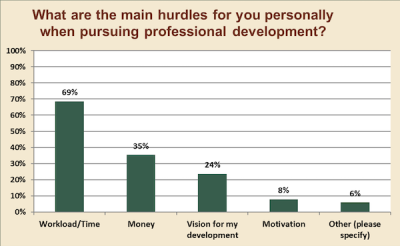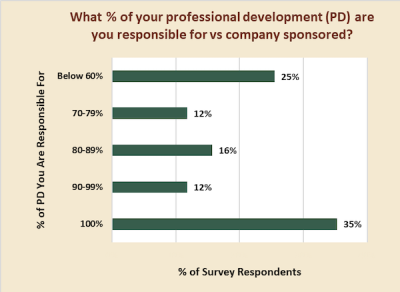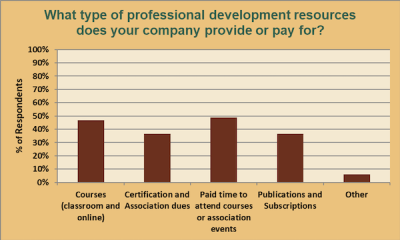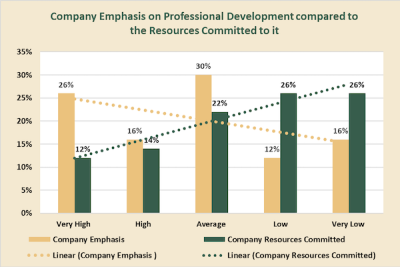Professional Development for Accounting and Finance Leaders
CFO.University polled accounting and finance leaders to understand how they are approaching professional development (PD) and what the future of PD looks like.
Over 80% of the respondents are leaders in industry with nearly 20% being leaders of professional service practices.
Let’s jump right in.
Hurdles Preventing Professional Development
Nearly all of us agree that professional development is important to the satisfaction we get from our work. Doing a good job and finding engaging work are two of the key factors in what employees claim are common in the best jobs1. Both rely on getting better, or developing professionally. But we also face barriers to PD. Here is how the survey respondents identified the barriers they are facing.

It was no surprise that lack of time outdistanced the second biggest hurdle by nearly twice the vote in the poll. The reputation of professionals in finance and accounting is one of hard work and completing tasks with whatever it takes. The cost of this work ethic is precious little time to split between our families, our health, entertainment and professional development. To help overcome this barrier, we recommend integrating your professional development into your work day. Add professional development to your daily checklist.
Money was scored as the second biggest hurdle. There is good news on this front. First, the cost of quality PD opportunities is coming down while the options for quality learning are growing. For learners this is a key bonus. Second, more and more companies are recognizing the benefits of using outside resources to develop their accounting and finance teams. They are willing to pay for programs, dues or subscriptions that grow their employees in directions the company can benefit from. The proverbial win/win. If your business doesn’t have a specific policy around payment or reimbursement for professional development create one with them.
¼ of the respondents cited lack of a ‘development vision’ as encumbering their professional development. To remove this barrier we suggest you make a Professional Development Plan (PDP). It doesn’t have to be fancy. In fact, here is a template you can use. If you are already a CFO or your career journey is headed that way use this Assessment to assist you in preparing your PDP.
Who is Investing in My Professional Development?

The poll respondents overwhelmingly held themselves accountable for their professional development with 35% feeling 100% responsible for their PD. Less than 10% held their companies accountable for more than 50%. It’s not certain whether respondent’s companies didn’t provide PD or if the respondents didn’t trust their companies could provide the quality PD they need for a successful career.
There are two key takeaways from this result.
First, taking responsibility may seem like the right approach but if we let the barriers get in the way this could actually limit our growth and future opportunities. Think of it this way. If your barriers to learning are serious impediments to your professional development, consider a company with a strong culture of learning and development. Overcoming your barriers will be easier when you have a company whose learning culture supports your professional development.
Second, when employees feel highly responsible for their own professional development, companies may find it difficult to direct the PD of their leaders in a way that also benefits their companies. As you might expect, CFO.University is a big believer in professional development and views an employee/employer partnership as being a win/win for both parties.
Employee perspective. Help your company understand how the professional development in your PDP will also benefit the company. This communication serves two purposes. First, it keeps your employer aware of your career goals and second, it’s more likely they will co-invest in your PD when its clear how they will benefit.
Company perspective. Create a PD policy that encourages your employees to grow in directions that benefit the company. By aligning the PD goals of the company with the PD goals of your employees the company will create a more capable and stable workforce.
Professional Development Resources Provided or Paid by Companies

Even with the employees feeling responsible for their professional development their companies are still providing significant financial support. Nearly 50% of employers are paying for courses, association events and time to attend them. 35% are paying for professional certifications or association dues and publications or subscriptions.
The opportunities here include broadening the types of PD your company offers or pays for. Find a community that fits with your PD goals and engage with them. If dues or meeting fees are prohibitive your company may be willing to invest or co-invest with you so they can benefit from the new skills you will acquire. In addition to specific course work, membership in professional associations and affinity groups or attending targeted conferences or coaching programs can be excellent resources for PD.
A Mismatch in Corporate Desire to Offer Professional Development vs Corporate Funding for It

Participant’s in the poll indicate a mismatch between the emphasis their companies place on professional development and on the resources they commit to it. These would seem to be areas where improved communication and potentially more investment would help companies better align with the perceptions their employees have to their development. Here are two possible opportunities companies can pursue:
1. Increase the resources committed to professional development to match the importance employees believe their companies place on it.
More guidance and architecture on what the company expects from the professional development it sponsors will help bridge this communication gap. If your company doesn’t already take the following two steps, adding these disciplines to your talent management team could go a long way toward improving the message:
- Develop a professional development resource center that includes the company policy on reimbursement for technical and non-technical skills development not part of an individual’s normal job duties.
- Include a Professional Development Plan as a part of each employee’s normal performance review process.
2. Better balance the importance placed on professional development with the resources committed to it. If the resources aren’t available or the company has other priorities, it’s important to communicate how they support professional development. For example, your company may pay a higher than average wage with the expectation some of the extra salary is used by their employees for professional development.
This article, What Tools and Resources Does Your Company Provide for Everyday Learning? includes a list of the professional development tools and resources companies are making available in addition to what key tools and resources are missing.
Increased Emphasis in Professional Development Offset by Decreases
There was an even split between respondents who believe the emphasis on professional development has changed over the past 5 years and those who don’t. Those who felt change had taken place were also evenly split between whether that change meant an increase or decrease in emphasis.
There is evidence to suggest teams who weren’t overwhelmed with their new environment or whose work load declined over this period have used this time to pursue new skills, tools and professional development in general. Improving capabilities and using virtual meeting tools has been a major focus. Team building has also taken center stage with other forms of remote work practices. A fourth area that didn’t come directly through in the survey but has been a trend we are seeing, is work process improvement focused on simplification using digital technology and collaboration tools.
Over the Past 5 years
Only 10% of employees indicated their companies made changes to their professional development process or policies since 2020. The comments related to these changes include:
- ” More online courses being made available by my company “
- ” Spending cuts in professional development as revenues have declined “
- ” More internal training is being done due to our workloads decreasing “
- ” A weekly reading list of materials is being shared “
- ” More outside resources being used to train remotely “
- ” An increase in motivation and encouragement from the CEO to develop professionally and personally “
72% of the poll takers haven’t seen much difference in the way their company implements professional development in the past 5 years. Of the 28% who have seen changes, here are the types of change they have seen.
- ” Less money to go around so their companies are more thoughtful about their approach to professional development “
- ” Costs have been cut so self-learning through books and lower priced online courses have been used as affordable options “
- ” Development has been more global and more online “
- ” Companies are offering incentives to create efficient home offices and mobile management “
- ” Reduced outside CPD training and more focus on in house programs. “
- ” Enhanced innovation is a key driver for expanding professional development “
Summary
1. The biggest hurdle to professional development is creating time for it.
- This is a mindset issue that can be overcome by making PD an essential, rather than elective part of your career.
2. Accounting and finance leaders are overwhelming taking responsibility for their own professional development.
- We encourage a strong partnership between employees and employers. A partnership increases the PD resources available to the employee while increasing the likelihood of the employer retaining a more highly skilled employee.
3. Employers generally indicate professional development is important but don’t match the aspiration with committed resources.
- This gap can be narrowed with thoughtful communication from the company on how it will reward and support professional development, creating a professional development resource center and using a PDP with all applicable employees.
4. Over the past 5 years over 50% of companies included in the survey have adjusted the training emphasis, but that shift was equal between increasing emphasis and decreasing emphasis.
- Budget concerns and reducing costs were the primary drivers of decreasing emphasis while new technology and greater productivity were drivers of increasing emphasis. The Work From Home phenomena, which erupted during the pandemic, has had mixed results depending on who you speak with, size of company, industry and more.
5. Almost 1/3 of Survey respondents expect to see their companies make significant changes in the way their companies implement professional development plans for their employees.
- Responses ranged from PD being more online, more global and more innovation (tech, especially AI) focused to new budget constraints reducing company sponsored PD or bringing it more in house to reduce costs.
1 Fast Company 6 things that the best jobs have in common
Identify your path to CFO success by taking our CFO Readiness Assessmentᵀᴹ.
Become a Member today and get 30% off on-demand courses and tools!
For the most up to date and relevant accounting, finance, treasury and leadership headlines all in one place subscribe to The Balanced Digest.
Follow us on Linkedin!
